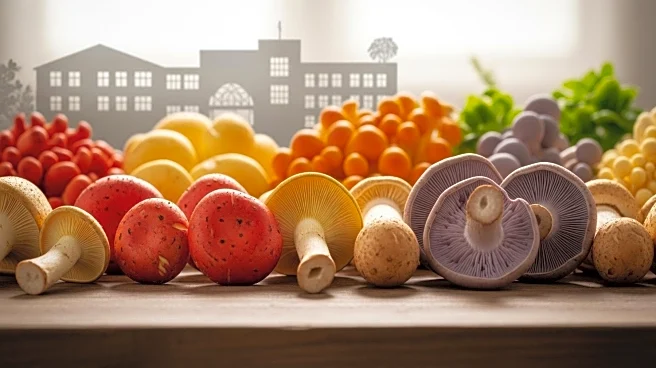What's Happening?
The Rwanda Agriculture and Animal Resources Development Board has initiated a program to train primary school students in mushroom cultivation, responding to increased demand for mushrooms in school feeding programs. This initiative is part of a broader effort to promote agricultural education and self-reliance among young pupils. The program is supported by the China-Rwanda Agriculture Technology Demonstration Center, which has introduced Juncao technology, a method using specially cultivated grass to grow mushrooms. This technology has empowered women entrepreneurs and improved local farming practices, with over 40,000 farmers trained. The initiative also includes distributing 10,000 mushroom tubes monthly to expand the technology's reach.
Why It's Important?
The introduction of mushroom cultivation in schools is significant for Rwanda's agricultural and educational sectors. It promotes sustainable agriculture and self-reliance among young students, potentially leading to long-term economic benefits. By incorporating mushrooms into school feeding programs, the initiative addresses child nutrition and supports local agricultural development. The empowerment of women through training and entrepreneurship opportunities further contributes to poverty alleviation and gender equality. The collaboration with Chinese experts highlights international cooperation in advancing agricultural technology, which could serve as a model for other countries seeking sustainable development solutions.
What's Next?
The Rwanda Agriculture and Animal Resources Development Board plans to continue expanding the reach of Juncao technology by collaborating with more farmers and distributing mushroom tubes. The government is likely to maintain support for training programs and scholarships to encourage adoption of the technology. As demand for mushrooms grows, there may be increased opportunities for local entrepreneurs to enter the market, potentially leading to economic growth and job creation. The success of this initiative could inspire similar programs in other regions, promoting sustainable agriculture and education globally.
Beyond the Headlines
The use of Juncao technology in Rwanda represents a shift towards environmentally friendly agricultural practices. By reducing reliance on traditional wood-based cultivation, the technology helps conserve forest resources and promotes ecological conservation. The initiative also highlights the role of women in driving agricultural innovation and entrepreneurship, challenging traditional gender roles and contributing to social change. The collaboration between Rwanda and China underscores the importance of international partnerships in addressing global challenges such as poverty and environmental sustainability.










